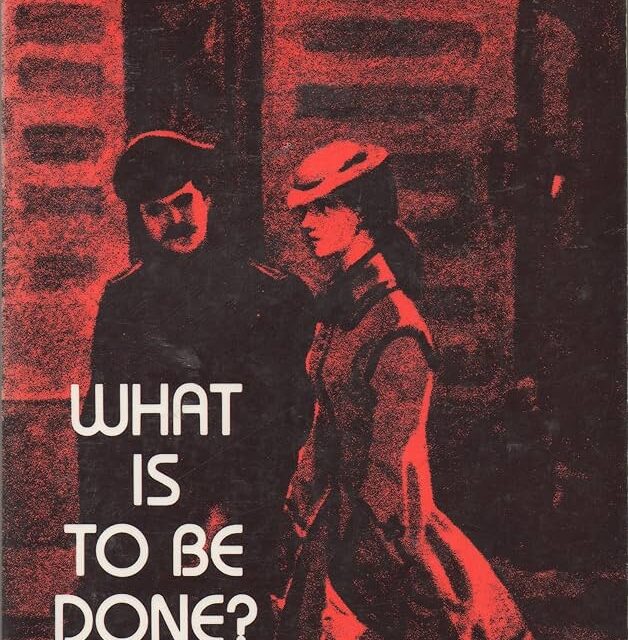Nikolay Chernyshevsky’s novel What is to Be Done? saw the light of day in 1862. A utopian socialist and, more specifically, a physiological materialist, Chernyshevsky wrote the book from his cell in the Tsarist St. Peter and Paul Fortress, the most notorious of Imperial Russia’s prisons. It remains significant to Russo-Slavic scholars in spite of its being, in the estimation of Lenin biographer Viktor Sebestyen, all but unreadable—a judgment with which I heartily concur. For the record, Lenin read it five times and not as an act of self-flagellation. He kept one picture on the wall of his office, that of Chernyshevsky, and gave one of his most famous political and revolutionary works the same title.
That title resonates in this discombobulated political season as our country slouches toward the November presidential elections. For those of us who are conservatives, the kind that supported Barry Goldwater in 1964 and Ronald Reagan in 1980 (some of us as early as 1968), the Republican Party has become steadily unrecognizable. But I’m getting ahead of myself. What ideas are driving both parties today, where did they come from, and why should anyone celebrate their development?

Starting with the Democrat Party, it has molded itself as the party of progressivism (really its proper title) for at least one hundred years. Excluding Alf Smith’s brief time as the party’s standard-bearer in the twenties, the major players on the liberals’ stage have been progressives: Wilson, Roosevelt, Johnson, and Obama. Love ’em or hate ’em, few would deny that these men advocated big government and stayed consistent in their advocacy.
What was at the heart of their political orthodoxy? Chiefly, it’s the matter of history. I know all thoughtful men—including thoughtful statesmen—have some grasp of history. They winnow from the past the various ways men have attempted to understand the world around them, to understand mankind itself, and, from those endeavors, to arrive at some idea of the good society. They also harbor a powerful sense that “history will judge them,” meaning simply that men in the future will look back at what men of an earlier time did and praise or blame them for their successes or failures.
In American progressivism, however, history carries a different definition. Our Founding Fathers insisted that man had a nature, a nature that rendered him, as Madison famously said, less than angelic. Yet mankind also, in the words of the Declaration of Independence, was “endowed” by God with certain “unalienable rights.” And we all know what they were.
Progressive thinkers of the late nineteenth and early twentieth century, men such as Richard Ely, Wilson, and Herbert Croly, declared this philosophy passé. Talk of natural rights and “nature’s God,” they argued, served men well enough in colonial times, but history had taken us beyond such ideas. Science and technology had advanced, and the complexity of modern society had made rule by an elite necessary. Naturally, this elite would labor to create a fair and democratic society, but in doing so, the government would perforce expand and centralize, with the executive becoming more imperial. And, as F.D.R. said in one of his last speeches, those standing in the way of this vision of America—clearly men who hearkened back to the principles of the Founding—are tantamount to Fascists. (If you don’t believe the statement, see Charles Kesler’s book I Am the Change: Barrack Obama and the Crisis of Liberalism.)
To be sure, progressives today pay some lip service to the Constitution and the Founding, assuring anyone who will listen of their desire to preserve “democracy as we have known it.” But that’s according to progressive lights; the ideals of limited government are alien to their thought and policy. The rise of Wokism tore the sheepskins off their backs to reveal a pack that saw America’s past—its Founding and its institutions—as a nefarious plot of dead white males to dominate others, with oppression built into the system. Nothing the so-called moderate Joe Biden or Kamala Harris, his replacement, has said can soften their consistent message about American history and future.
But what of the Republicans? There was a time when a fairly robust, limited-government message defined the G.O.P. Harding, Coolidge, and, most recently, Reagan openly championed lower taxes and a diminished bureaucratic footprint. The current slate of Donald Trump and J. D. Vance locates the country’s needs by a very different compass. They look to the people to determine the policies they should adopt and envision a more interventionist central government to give the people what they want or need. The words populism and National Conservatism are most often used to describe where the current nominees stand—except for the editors of the New Republic who prefer the label “Fascism.”
The irony of the left’s hatred of Trump (and now Vance) is that this new Republican Party shares some of the progressives’ fundamental assumptions. Here are two. First, they adopt the position that history has passed the “old” low-tax, limited-government conservatism by. In other words, the historicism of Ely, Wilson, and Croly informs both sides of the political divide. Second, they share the left’s understanding that an activist central government is essential to a good society. Oren Cass, one of the gurus of National Conservatism, has stated the case succinctly: “the purpose of government is to solve problems.” Pick any liberal from the start of the twentieth century to now, and you’ll find Cass’s dictum lodged at the heart of his political philosophy and its practical application.
November’s election has more at stake than the philosophical underpinnings of the Republican Party; inflation, abortion, and immigration present us with moral and civilizational choices, the results of which will extend far into the future. These are “problems” the central state has created that certainly need to be solved.
However, our Founders, very practical men, did not see government as chiefly a problem-solving entity. They declared its purpose very plainly: to secure the God-given rights of the people. A government that primarily goes about solving problems as the progressives and now National Conservatives prefer soon becomes a meddlesome government, promising sometimes a chicken in every pot but inevitably guaranteeing a bureaucrat in every corner.
Are we to remain the United States envisioned by Washington, Adams, Jefferson, and, yes, Hamilton, or are we to witness a rebirth of our country as Bismarckian Germany? Apparently, the leading figures of both parties lean toward the latter, leaving us to ask, “What, indeed, is to be done?”














